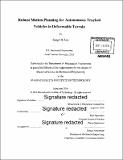Robust motion planning for autonomous tracked vehicles in deformable terrain
Author(s)
Lee, Sang Uk, (Scientist in Mechanical Engineering), author.
DownloadFull printable version (11.28Mb)
Other Contributors
Massachusetts Institute of Technology. Department of Mechanical Engineering.
Advisor
Karl Iagnemma.
Terms of use
Metadata
Show full item recordAbstract
Ensuring the safety of autonomous vehicles during operation is a challenging task. Numerous factors such as process noise, sensor noise, incorrect model etc. can yield uncertainty in robot's state. Especially for tracked vehicles operating on rough terrain, vehicle slip due to vehicle terrain interaction affects the vehicle system significantly. In such cases, the motion planning of the autonomous vehicle must be performed robustly, considering the uncertain factors in advance of the real-time navigation. The primary contribution of this thesis is to present a robust optimal global planner for autonomous tracked vehicles operating in off-road terrain with uncertain slip. In order to achieve this goal, three tasks must be completed. First, the motion planner must be able to work efficiently under the non-holonomic vehicle system model. An approximate method is applied to the tracked vehicle system ensuring both optimality and efficiency. Second, the motion planner should ensure robustness. For this, a robust incremental sampling based motion planning algorithm (CC-RRT*) is combined with the LQG-MP algorithm. CC-RRT* yields the optimal and probabilistically feasible trajectory by using a chance constrained approach under the RRT* framework. LQG-MP provides the capability of considering the role of compensator in the motion planning phase and bounds the degree of uncertainty to appropriate size. Third, the effect of slip on the vehicle system must be modeled properly. This can be done in advance of operation if we have experimental data and full information about the environment. However, in case where such knowledge is not available, the online slip estimation can be performed using system identification method such as the IPEM algorithm. Simulation results shows that the resulting algorithms are efficient, optimal, and robust. The simulation was performed on a realistic scenario with several important factors that can increase the uncertainty of the vehicle. Experimental results are also provided to support the validity of the proposed algorithm. The proposed framework can be applied to other robotic systems where robustness is an important issue.
Description
Thesis: S.M., Massachusetts Institute of Technology, Department of Mechanical Engineering, 2016. Cataloged from PDF version of thesis. Includes bibliographical references (pages 90-95).
Date issued
2016Department
Massachusetts Institute of Technology. Department of Mechanical EngineeringPublisher
Massachusetts Institute of Technology
Keywords
Mechanical Engineering.